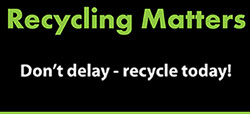What happens to your recycling
Find out what happens to the items we recycle and why it's important to recycle. Over 287 million cans, foil trays and aerosols are used every year in County Durham.
Over a year, the average household uses approximately 600 food tins, 380 drink cans, 27 aerosols and 182 foil trays - but less than half of these items are going to be recycled.
What happens to your recycling

- Fill your blue lidded bin with your recycling
- Recycling is collected and delivered to a Materials Recycling Facility (MRF) in Hartlepool
- All materials are separated and sorted
- The materials are treated to make new raw materials
- The raw materials are now used in the production of a new product
- The products are back on the shelf as a new bottle or tin can in as little as six weeks
See What happens to your plastic for more details around this process.
It takes less energy to use recycled materials
If all of the metal packaging used in County Durham was recycled each year 7,773 tonnes of carbon dioxide would be saved, the equivalent to taking 1,650 cars off the streets for a year.
Used metal packaging can be recycled into new products at a far lower cost to the environment than making them from raw materials. Making cans from recycled material saves up to 95 per cent of the energy, and greenhouse gas emissions, needed to make both aluminium and steel from scratch.
For every two extra cans you include with your recycling, you'll save enough energy to run a computer for up to 12 hours, or a TV for four hours.
What your recycling becomes
Recycled plastic bottles are turned into:
- new bottles
- t-shirts
- furniture
Recycled tins, cans, foil and foil trays and aerosols can be used to make parts for new:
- cars
- mobile phones
- kettles
What happens to your plastic
Our material recycling contractor Biffa send the vast majority of plastic to markets and reprocessors within the UK. Biffa's policy seeks to only export materials where there is no viable UK outlet. Any material Biffa does export for recycling (such as some plastic film and small amounts of rigid plastics) is done through licensed and accredited exporters. All material is sent to licenced facilities which have been approved by the UK Environment Agency.
The contents of our blue-lidded recycling bin and recycling box are sent to Biffa's material recycling facility in Washington, Tyne and Wear. Here the materials are sorted into type (plastics, paper, cardboard, metal tins and cans), any waste (contamination) is removed and the materials are baled, ready to be sent on to be reprocessed and recycled. The majority of materials collected from the kerbside collection scheme are recycled and made into new products, for example plastic bottles are made into new plastic bottles.
As part of the Government's Resources and Waste Strategy for England, we welcome the Government's proposals that UK infrastructure should be developed in order to manage recycling of materials in this country. You may be interested to know that Biffa, our contractor are investing in a new recycling plant in Seaham, County Durham where the majority of our plastics will be processed for recycling in the near future.
Single Use Plastic Pledge
We have recently adopted a Single Use Plastic (SUP) Pledge, together with numerous partners such as Environment Agency, Northumbrian Water, Durham University, Beamish Museum and local schools. The Pledge aims to raise awareness about SUPs and is a call to action for people to provide a commitment to prevent and find alternatives to SUPs. The Pledge can be signed by individuals, organisations and community groups across the county, with the intention to create a SUP network. For further information see our Sign up to our single use plastics pledge page. In addition, we provide information and advice across the county to residents, schools and community groups on waste prevention, reuse, recycling and composting, in order that waste and recycling is managed in the most sustainable ways possible.
What happens to household rubbish
It is also worth noting that we no longer send any household rubbish (from the household rubbish bin) to landfill, as we have an Energy from Waste contract with Suez. As part of this contract, rubbish is sent to the plant on Teesside where it is burned to create energy. From across County Durham, we produce on average 60,000 MWh (Megawatt hours) from energy from waste which can power 19,000 households in one year.
Collected recycling
For households in County Durham, the contents of the blue-lidded recycling bin and recycling box is taken to one of the council's four Waste Transfer Stations. Here material is checked and pre-sorted in order to maintain quality. Recycling is then sent to Biffa's material recycling facility at Hartlepool. Here the materials are separated into type, (for example plastics, paper, cardboard, metal tins and cans), any contamination is removed and the materials are baled, ready to be sent on to be reprocessed and recycled into new products for example plastic bottles are made into new plastic bottles.
How plastic is recycled
Our material recycling contractor Biffa send the vast majority of plastic it receives from us to markets and reprocessors within the UK. Biffa's policy seeks to only export materials where there is no viable UK outlet. Any material Biffa does export for recycling, (for example, some plastic film and small amounts of rigid plastics) is done through licensed and accredited exporters.
As part of the Government's Resources and Waste Strategy for England, we welcome the Government's proposals that UK infrastructure should be developed in a more consistent way in order to improve recycling of materials in this country. Biffa have recently invested in a new recycling plant in Seaham, County Durham where the majority of our plastics are being processed.
Energy from waste rather than landfill
We no longer send any household rubbish or residual, none recyclable waste to landfill, as we benefit from an Energy from Waste contract with Suez, based in Teesside where our rubbish is burned to create energy which is exported to the National Grid.
For further information on our waste and recycling services including household waste recycling centre information, please visit our Rubbish and recycling and Reduce, reuse, recycle pages.



 Share this page on Facebook
Share this page on Facebook
 Share this page on Twitter
Share this page on Twitter
 Print this page
Print this page





